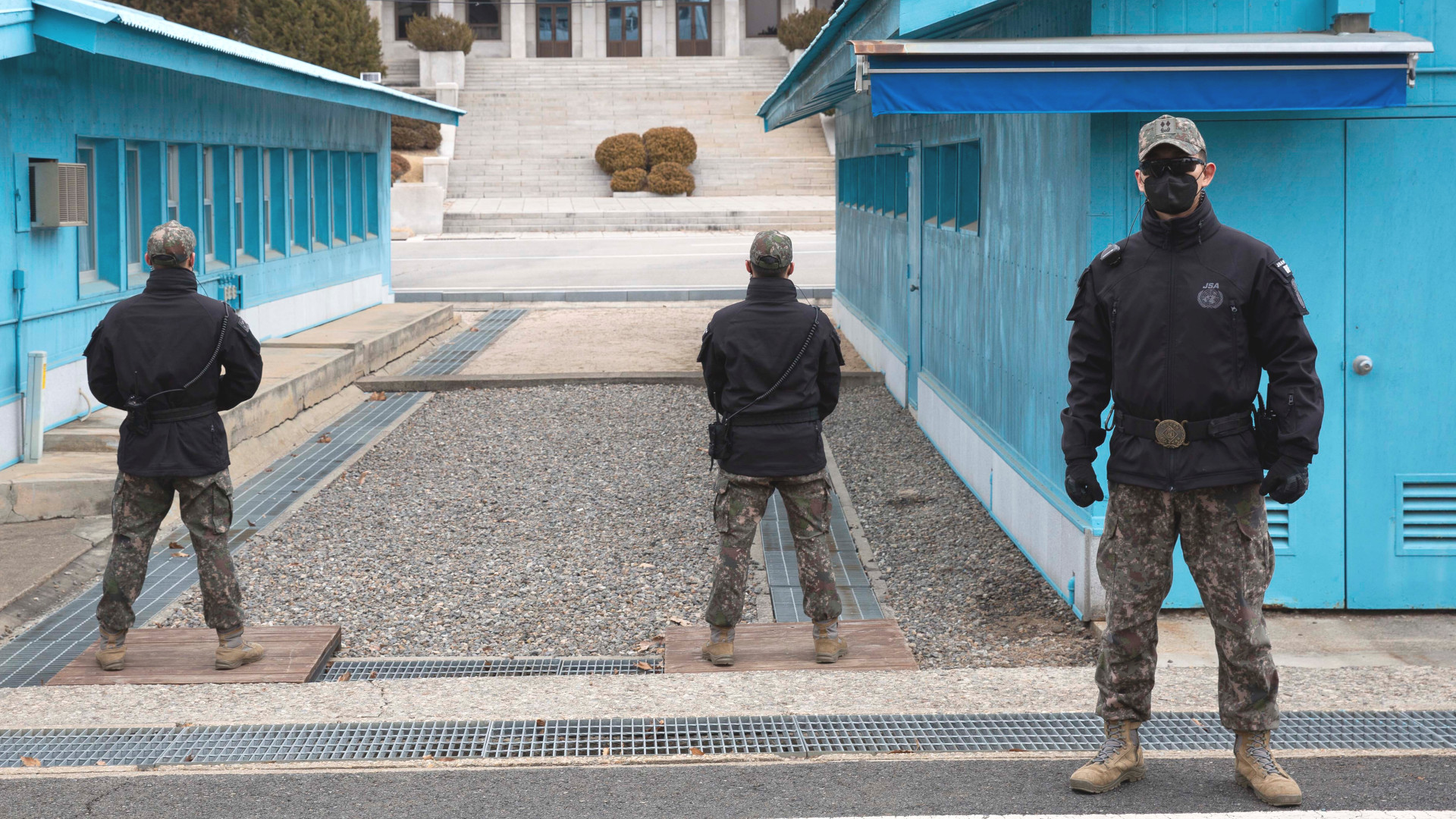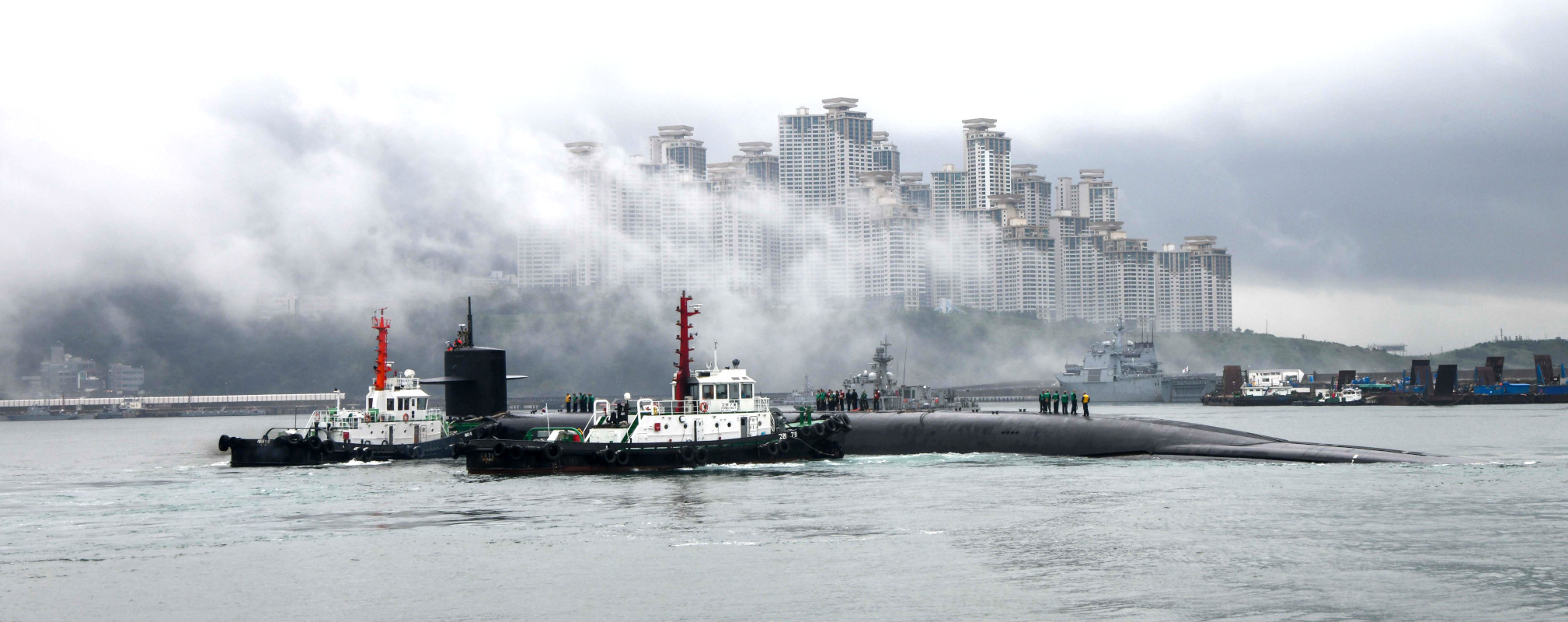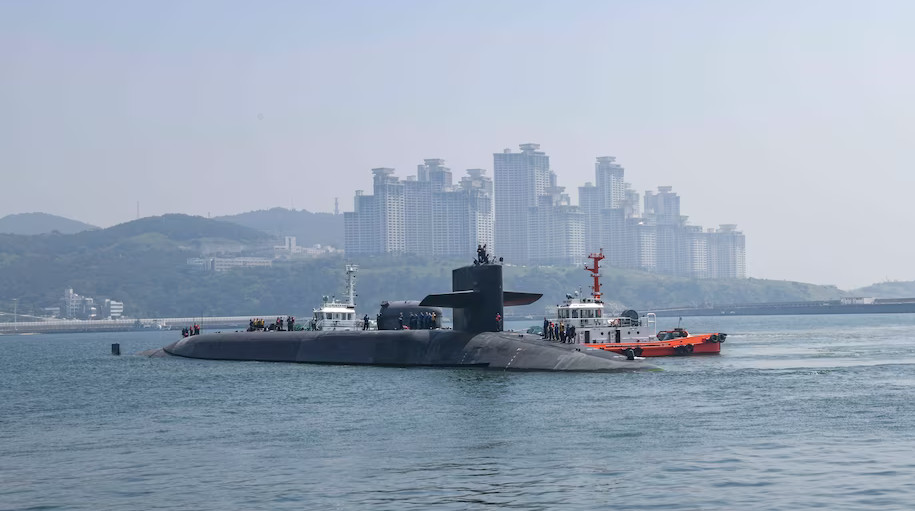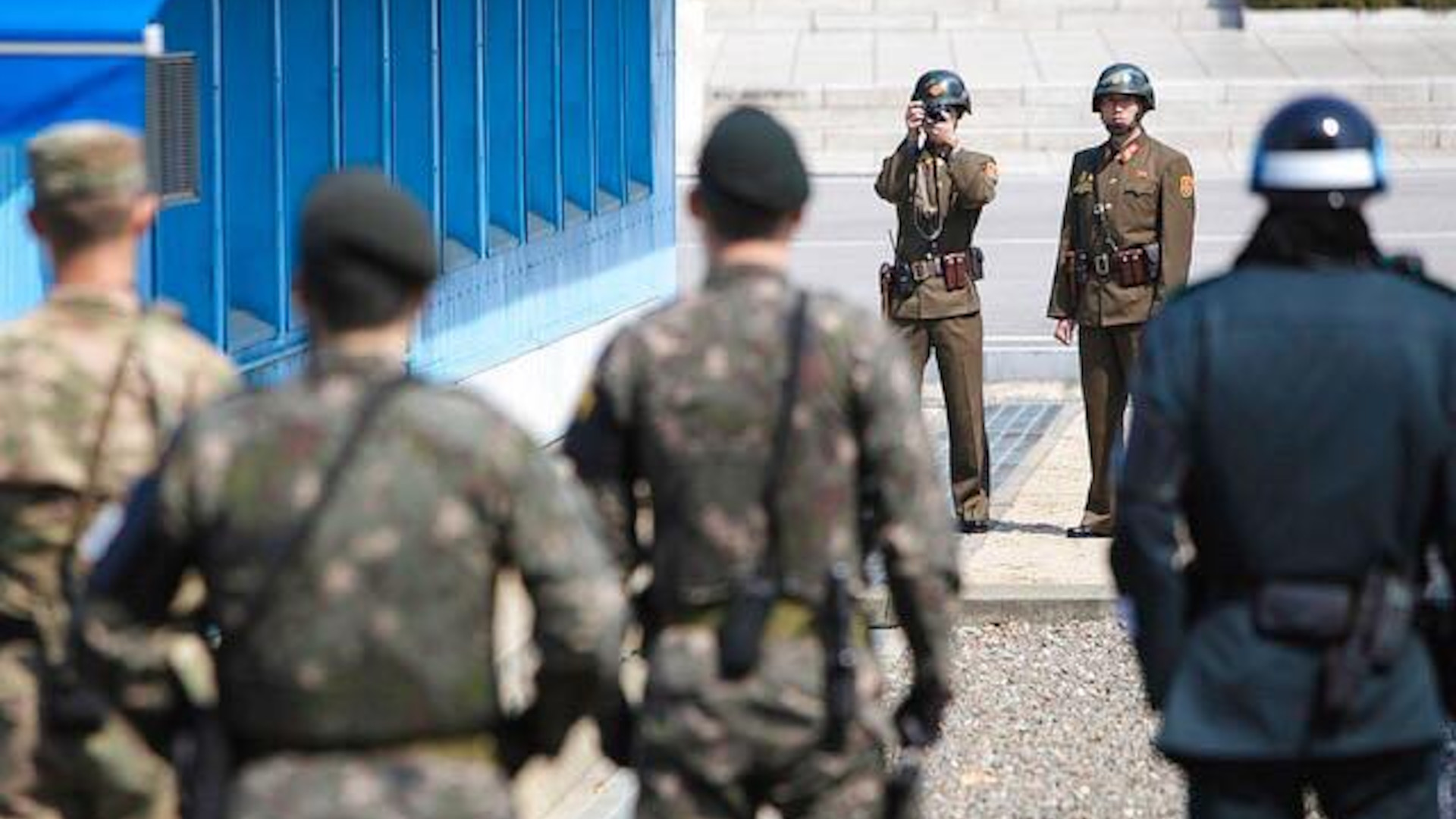A member of the U.S. armed forces is believed to be in detention in North Korea. That individual crossed the inter-Korean Military Demarcation Line at the Joint Security Area in Panmunjom and did so deliberately, though their exact motivations remain unclear. This comes amid a surge in geopolitical friction on the Korean Peninsula, punctuated by the arrival today of the first U.S. Navy Ohio class nuclear ballistic missile submarine to visit the South in four decades.
The U.S.-led United Nations Command (UNC), which oversees the Joint Security Area (JSA), disclosed the incident earlier today, but offered few details. The JSA, also known as the Truce Village, serves as an official meeting place for North and South Korean representatives, with shared spaces that they can enter from their respective sides of the demilitarized zone. It is also used for official engagements between the governments of the United States and North Korea, such as President Donald Trump’s famous meeting with North Korean leader Kim Jong Un in 2019. It is open to the general public through heavily structured tours.

“A U.S. National on a JSA orientation tour crossed, without authorization, the Military Demarcation Line into the Democratic People’s Republic of Korea (DPRK),” according to a UNC press release. “We believe he is currently in DPRK custody and are working with our KPA [Korean People’s Army] counterparts to resolve this incident.”
A machine translation of an accompanying version of that statement in Korean includes “and defected” after “without authorization.” At the time of writing, the UNC does not appear to have clarified this discrepancy.
“This was a deliberate decision on [the] part of the service member to cross the DMZ [Demilitarized Zone],” an anonymous U.S. official said, according to The Washington Post.
A spokesperson for U.S. Forces Korea (USFK) subsequently told Politico‘s Lara Seligman that the U.S. national in question was a member of the U.S. armed forces and had crossed over into the North “willfully.” USFK, which oversees the bulk of U.S. forces in South Korea, is separate from the UNC, but can provide support to the latter when requested. The commander of USFK, currently U.S. Army Gen. Paul LaCamera, is also head of the UNC, as well as the US-South Korean Combined Forces Command.
Various outlets had previously identified this individual as a member of the Army, citing anonymous sources. South Korean newspaper Dong-a Ilbo, citing information from the South Korean military, has reported that his name is Travis King and that he is a Private Second Class. CBS News has also now reported that Private King is the individual in question, but this remains unconfirmed.
How exactly the individual came to be part of the tour at the JSA is unclear.
“Private 2nd Class Travis King, who was being escorted back to the United States from South Korea for disciplinary reasons,” according to CBS‘s report. “After going through airport security to leave, he somehow returned and managed to join a border tour group before crossing into North Korea.”
He had spent a month and a half in a detention facility in South Korea already, a U.S. official said, according to VOA‘s Carla Babb.
The Washington Post had also reported that the U.S. service member now in North Korea had missed a scheduled flight back to the United States.
“A woman who said she was part of the tour group said they were at the last stop when they heard a loud ‘HA-HA-HA’ and saw the man, who’d been with the group all day, run ‘between two of the buildings and over to the other side,'” according to a separate report from NPR, citing a now-deleted Facebook post. “It took everybody a second to react and grasp what had actually happened… Then we were ordered into and through Freedom House and running back to our military bus.”

While it is still unknown whether the individual in question intended to defect to North Korea, this would not be the first time a member of the U.S. military has done so. At least six other U.S. service members are known to have defected to North Korea since the Armistice Agreement in 1953 brought an end to open warfare on the Peninsula. The last of these individuals was Army Private Joseph T. White, who crossed into the North in 1982 via a section of the DMZ unconnected to the JSA.
This is also not the first time a JSA has been used as a jumping-off point for a defector. In 2017, North Korean soldier Oh Chong Song fled south via the Truce Village in a dramatic episode captured on camera where he sped to the inter-Korean border first in a jeep before racing across on foot. North Korean border guards were firing at Oh the entire time and he suffered five gunshot wounds, reportedly losing half his blood in the process and requiring life-saving surgery.

In 1984, 22-year-old Soviet citizen Vasily Yakovlevich Matuzok also braved gunfire to defect to the West via the JSA. Matuzok had traveled to North Korea ostensibly as a tourist. Three North Korean border guards and one South Korean soldier were killed in that incident. A member of the U.S. military was among at least six others wounded on both sides.
Regardless, today’s incident at the JSA comes at a time when South Korean President Yoon Suk Yeol’s administration looks to be actively courting North Korean defectors with financial rewards based on recently released data. Yoon, who took office last year, has also taken a very hard line against North Korea, in general.
Furthermore, Yoon has pushed for greater security guarantees from the United States, especially in regard to nuclear deterrence. The arrival today of the U.S. Navy’s Ohio class nuclear ballistic missile submarine USS Kentucky in South Korea’s port of Busan is a direct result of a new nuclear policy-focused agreement, called the Washington Declaration, which the two countries announced in April. You can read more about this in detail here.

Kentucky‘s visit is the first time an American nuclear ballistic missile submarine, or SSBN, has made a port call in South Korea in some 40 years. In addition to 14 Ohio SSBNs, the U.S. Navy also has four boats in this class that have been converted into conventional guided missile submarines, or SSGNs, which also have a host of other multi-mission capabilities. These Ohio SSGNs have made multiple visits to the Peninsula over the years, including USS Michigan‘s stop in Busan just last month.

“The United States should stop a foolish act that could put its security at risk by provoking us,” Kim Yo Jong, Deputy Department Director of the Publicity and Information Department of the Workers’ Party of Korea and Kim Jong Un’s sister, said yesterday, according to state media. “The United States is being delusional if it believed that it could stop our advancement and achieve irreversible disarmament by temporarily halting joint military drills, deployment of strategic assets or easing of sanctions.”
Kim Yo Jong, among other North Korean officials, also warned last week that U.S. military intelligence, surveillance, and reconnaissance (ISR) aircraft could be shot down if they continue to fly in certain areas of the East Sea. Authorities in North Korea claim that there has been a recent uptick in aerial ISR activity over what North Korea claims as its Exclusive Economic Zone (EEZ) in the East Sea. It is worth noting that international law makes clear that a country cannot claim full sovereignty over the seas and airspace within an EEZ. These zones typically extend well beyond formal national boundaries.
The U.S. and South Korean militaries, among others, of course heavily monitor North Korea for signs of a variety of potentially malign activities. A surge in intelligence collection, broadly, in recent years is hardly surprising given North Korea’s increased cruise, ballistic, and hypersonic missile test activity following the end of a moratorium it had imposed on itself during the period of detente with the United States under President Trump. This has included demonstrations of various novel launch capabilities and of new super-large solid-fuel intercontinental ballistic missiles (ICBM). Just last week, the North Korean military conducted another test launch of its new Hwasong-18 ICBM.
North Korea has also been trying to launch what it says are spy satellites into space, albeit unsuccessfully so far. The most recent of those launches came in May, after which South Korean authorities were able to recover various components of the space launch rocket.
There continue to be concerns that the government in Pyongyang may be moving toward restarting nuclear weapon testing, as well.
All told, while much about the circumstances surrounding the U.S. service member crossing over into North Korea is still murky, it is clearly a major international incident that could have significant ramifications.
We will continue to update this story as more information becomes available.
UPDATE 1:50 PM EST:
ABC News has now reported that Private Travis King is the U.S. service member now in North Korea and that he had just recently completed two months in detention in South Korea following an altercation with local civilians. After then spending another week or so at “at a U.S. base in South Korea under observation” he was escorted to Incheon International Airport, according to that report.
“Because King had finished serving his time, he was no longer under custody,” ABC News’ story added. “An escort to the gate was not required, and there was no reason to suspect he would fail to board his flight.”
That report noted that the U.S. military is not planning to publicly identify King until a “next of kin notification” has been made. This process, typically reserved for service members who have died, is being employed in this case because “it’s not clear the soldier will ever return from North Korea.”
“I would say up front but we’re very early in this event. And so there’s a lot that we’re still trying to learn,” Secretary of Defense Lloyd Austin also said at a press conference today about the incident. “What we do know is that one of our service members, who was on a tour, willfully and without authorization, crossed the military demarcation line. We believe that he is in DPRK custody.”
“We’re closely monitoring and investigating the situation, and working to notify the soldier’s next of kin,” Austin continued. “In terms of my concerns, I’m absolutely foremost concerned about the welfare of our troop.”
The U.S. Defense Secretary added that he expected the situation to continue developing for at least another few days.
CNN has also reported now that the State Department has not yet attempted to reach out to the North Koreans or intermediaries, such as China, since DOD is taking the lead given that the individual is a U.S. service member.
Contact the author: joe@thedrive.com
